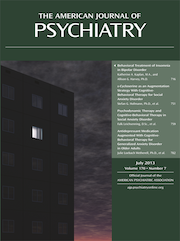The Separation Anxiety Hypothesis of Panic Disorder Revisited: A Meta-Analysis
Abstract
Objective
Evidence suggests that childhood separation anxiety disorder may be associated with a heightened risk for the development of other disorders in adulthood. The authors conducted a meta-analysis to examine the relationship between childhood separation anxiety disorder and future psychopathology.
Method
PubMed, PsycINFO, and Embase were searched for studies published through December 2011. Case-control, prospective, and retrospective cohort studies comparing children with and without separation anxiety disorder with regard to future panic disorder, major depressive disorder, any anxiety disorder, and substance use disorders were included in the analysis. Effects were summarized as pooled odds ratios in a random-effects model.
Results
Twenty-five studies met all inclusion criteria (14,855 participants). A meta-analysis of 20 studies indicated that children with separation anxiety disorder were more likely to develop panic disorder later on (odds ratio=3.45; 95% CI=2.37–5.03). Five studies suggested that a childhood diagnosis of separation anxiety disorder increases the risk of future anxiety (odds ratio=2.19; 95% CI=1.40–3.42). After adjusting for publication bias, the results of 14 studies indicated that childhood separation anxiety disorder does not increase the risk of future depression (odds ratio=1.06; 95% CI=0.78–1.45). Five studies indicated that childhood separation anxiety disorder does not increase the risk of substance use disorders (odds ratio=1.27; 95% CI=0.80–2.03). Of the subgroup analyses performed, differences in comparison groups and sample type significantly affected odds ratio sizes.
Conclusions
A childhood diagnosis of separation anxiety disorder significantly increases the risk of panic disorder and any anxiety disorder. These results support a developmental psychopathology conceptualization of anxiety disorders.



